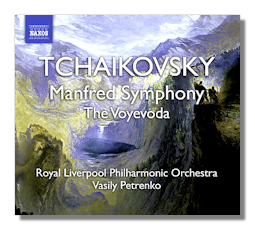
The Internet's Premier Classical Music Source
Related Links
- Tchaikovsky Reviews
- Latest Reviews
- More Reviews
-
By Composer
-
Collections
DVD & Blu-ray
Books
Concert Reviews
Articles/Interviews
Software
Audio
Search Amazon
Recommended Links
Site News
 CD Review
CD Review
Piotr Ilyitch Tchaikovsky

- Manfred Symphony, Op. 58
- Symphonic Ballad "The Voyevoda", Op. 78
Royal Liverpool Philharmonic Orchestra/Vasily Petrenko
Naxos 8.570568 68:51
Like Berlioz' Harold in Italy, Tchaikovsky's Manfred Symphony is a four-movement programmatic work based on a poem by Byron. Like the Berlioz work, Tchaikovsky's is extremely romantic. Schumann also wrote a work based on "Manfred"; in that case a choir and speaker using Byron's words in abridged form are in addition to a large orchestra. Tchaikovsky's Manfred Symphony, for large orchestra without instrumental or vocal soloists, is by far the longest of these works, running nearly an hour in duration. A summary of the programmatic content is provided in the notes accompanying the CD and, as the work can be enjoyed without reference to the poem, I will comment simply on the music.
Recorded much less frequently than any of Tchaikovsky's numbered symphonies, even the early ones, the Manfred deserves to be much better known. It contains the kind of melodic appeal and colorful orchestration that makes Tchaikovsky such a popular composer and it has dramatic interest besides. For anyone unfamiliar with it but who cares for the work of its composer, this recording will be a refreshing change and a desirable acquisition. The performance is excellent and the recording quite adequate.
Written between his fourth and fifth symphonies, this work's opening, marked "Lento lugubre," is reminiscent of the sixth. The rest of the movement is marked "Moderato con moto" and then "Andante." Details I noticed on this hearing included a brief passage reminiscent of Swan Lake and, particularly, the quiet way Tchaikovsky ends the movement, more like the way Sibelius ends the opening movement of his first movement than with Tchaikovsky's more usual practice. Various moods expressed along the way include moments of rising tension, culminating in climaxes; there are ominous episodes, but also a quiet moment marked by a new theme.
The second movement, "Vivace con spirito," the only one that runs less than ten minutes, and my personal favorite, opens with scurrying motion and a rather upbeat melody, which is tantalizing and captivating. When the music quiets and slows, Tchaikovsky gives us a waltz, which is eventually heard below that scurrying melody. There is also a dramatic episode with drum rolls, but the movement ends quietly.
The "Andante con moto" opens at just the right tempo. So many conductors pace an andante at a speed that causes me to look again at what the composer specified, but that is not the case with Petrenko's take. There is considerable variety in this movement: the liveliness of a scherzo, then passages that are, in turn, dance-like, song-like, ominously dramatic and, finally there is a gentle and quiet mood, expressed by flute and clarinet.
The long (over twenty minutes) "Allegro con fuoco" final movement begins as one would expect from that designation, and the heated dramatic expression includes an ominous march section, but there are some slow lyrical passages, including sounds from the harp, before a thunderous organ passage close to the end, which rivals some in Saint- Saens' Organ Symphony, but again Tchaikovsky surprises us by ending the work quietly and gently.
As will be clear from my account, there are very many changes of pace and mood in the Manfred Symphony. Especially considering the length of this work, these are naturally a challenge for any conductor. The way Petrenko handles these changes and transitions is impressive and an outstanding merit of this recorded performance. Petrenko's pacing is always apt; the phrasing is clear and effective; climaxes are well-built; the quiet passages are relaxed; and the transitions between different kinds of music (dance, march, etc.) always work well.
"The Voyevoda" is another lesser-known work, also based on poetry, this time Mickiewicz's by way of Pushkin; the theme of which is jealousy and murder. One of Tchaikovsky's late works, and admittedly a minor one, it is nevertheless worth hearing for its melodic content and perhaps the cross-genre transformation, if one is interested in that sort of thing.
Recently I attended a concert with Petrenko conducting the Milwaukee Symphony. It was thoroughly enjoyable in spite of the fact that another work was substituted for the originally scheduled Manfred, which I had hoped to hear live. Following that concert there was a talk-back and I was struck by Petrenko's response to a comment from a member of the audience who was impressed by the way the conductor did not permit the orchestra to overwhelm the soloist in a concerto. Petrenko's quiet and brief reply revealed, I think, much about the kind of conductor he is; he simply said that that is what the score called for.
Copyright © 2009, R. James Tobin




















